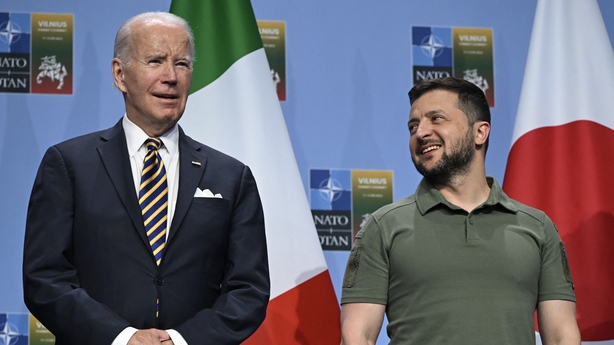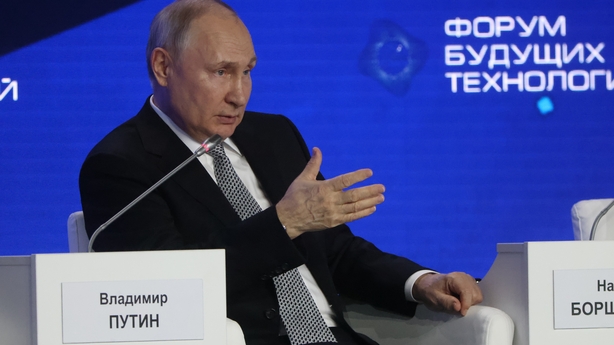US President Joe Biden has said that Russia's Vladimir Putin has already lost the war in Ukraine, expressing hope that Kyiv's counter-offensive would force Moscow to the negotiating table.
As Russia launched fresh strikes and a new bout of nuclear-sabre rattling, Mr Biden said there was no real prospect of Mr Putin using nuclear weapons and insisted the war would not drag on for years.
Mr Biden also used a visit to Finland, NATO's newest member, to pledge that Ukraine would one day join the alliance, despite NATO leaders failing to give Kyiv a timeline at a key summit this week.
"Putin's already lost the war. Putin has a real problem," Mr Biden told a press conference with Finnish President Sauli Niinisto.
"There is no possibility of him winning the war in Ukraine."
But while Mr Biden said no country could become a NATO member while it was at war - with Ukraine joining now meaning a "third world war" - he vowed Kyiv would one day join the club.
"It's not about whether or not they should or shouldn't join. It's about when they can join, and they will join NATO," Mr Biden said.
'Don't go there'
Moscow's riposte to the NATO summit came in the form of its latest aerial assault on Ukraine, injuring four people, while Kyiv said it had destroyed 20 Russian attack drones and two cruise missiles.
In a sign of its anger at Western backing for Kyiv, Moscow said it would regard F-16 fighter jets sent to Ukraine as a "nuclear" threat because of their capacity to carry atomic bombs.
"Russia cannot ignore the ability of these aircraft to carry nuclear weapons. No amount of assurances will help here," Foreign Minister Sergei Lavrov was quoted as saying by the Russian foreign ministry.
But Mr Biden played down the latest bout of nuclear rhetoric from Russia.
"I don't think there's any real prospect... of Putin using nuclear weapons. Not only has the West but China and the rest of the world has said don't go there," he said.
Wagner chief Yevgeny Prigozhin should meanwhile be careful of poisoning following the mercenary group's failed uprising in Russia, Mr Biden added.
"God only knows what he's likely to do," Mr Biden said in Helsinki.
"We're not even sure where he is and what relationship he has.
"If I were (him), I'd be careful what I ate. I'd keep my eye on my menu."
Mr Biden also said he was "serious" on the prospect of a prisoner exchange for jailed Wall Street Journal reporter Evan Gershkovich to get him home from Russia.

'Unwavering'
The US president was holding talks in the Finnish capital after G7 powers vowed to back Ukraine for as long as it takes to beat Russia.
Finland, which shares a 1,300 kilometre border with Russia, ended its historic military non-alignment and joined NATO following Moscow's invasion of Ukraine.
Biden and the leaders of Denmark, Finland, Iceland, Norway and Sweden pledged "unwavering" support for Ukraine in a joint statement after the talks.
They also discussed climate, which Mr Biden called the "only existential threat humanity faces".
Mr Biden is the first US president to visit Helsinki since Donald Trump's summit five years ago with Mr Putin, and his press conference took place in the same hall.
He pledged that the United States would remain a member of NATO, after being asked about what would happen if Mr Trump, who mooted pulling out of the alliance, is re-elected next year.
But Mr Biden's stress on the strength and symbolism of NATO contrasted with events at the NATO summit, when Mr Zelensky slammed the "absurd" decision not to fast-track Ukraine's membership.
Instead, G7 nations later offered Ukraine a package of long-term security commitments, involving bilateral deals between Kyiv and the world's richest nations.
Mr Zelensky insisted the promises amounted to a "significant security victory" but did not disguise the fact that he would have preferred a timetable for Ukraine.
In Kyiv, recently-supplied Western weapon systems were insufficient to cover the whole country, the spokesman for Ukraine's air forces Yuriy Ignat said after the overnight strikes.
"We do not have means to destroy ballistic missiles," Mr Ignat told national television this morning.

Putin says new arms to Ukraine will change nothing on battlefield
Russian President Vladimir Putin said supplies of new weapons to Ukraine would change nothing on the battlefield but would only further escalate the conflict there.
Mr Putin, speaking on state television, also said tanks provided by Western powers to Ukraine would be a "priority target" for Russian forces fighting there.
He reiterated his opposition to Ukraine joining NATO, saying this would threaten Russia's own security.
Ukrainian armed forces have received cluster munitions pledged by the United States to boost its slow-moving counter-offensive against the Russian invasion, a senior army official has said.
"We just got them, we haven't used them yet, but they can radically change (the battlefield)," Ukrainian army commander Oleksandr Tarnavskyi told US broadcaster CNN in an interview.
The United States last week said it would deliver cluster bombs to Ukraine, despite concerns over the long-term risk posed to civilians.
"The enemy also understands that with getting this ammunition, we will have an advantage," Mr Tarnavskyi said.
The commander told CNN that Ukrainian forces would not deploy the weapon in heavily populated areas.
"The Russians think that we will use it on all areas of the front... This is very wrong," he said.
US President Joe Biden said the decision was "very difficult" but stressed Ukraine needed extra ammunition to refill its depleted stocks.
The controversial weapons can disperse up to several hundred small explosive charges, which can remain unexploded in the ground, creating a risk for civilians after a conflict is over.
They are banned by numerous countries - notably in Europe - who are signatories to a 2008 Oslo Convention, to which neither Russia, the United States or Ukraine are parties.
The Kremlin has said it will take "countermeasures" if the weapon is deployed by Ukraine against its troops.
Read more: Is there a moral justification for the use of cluster bombs by Ukraine?

